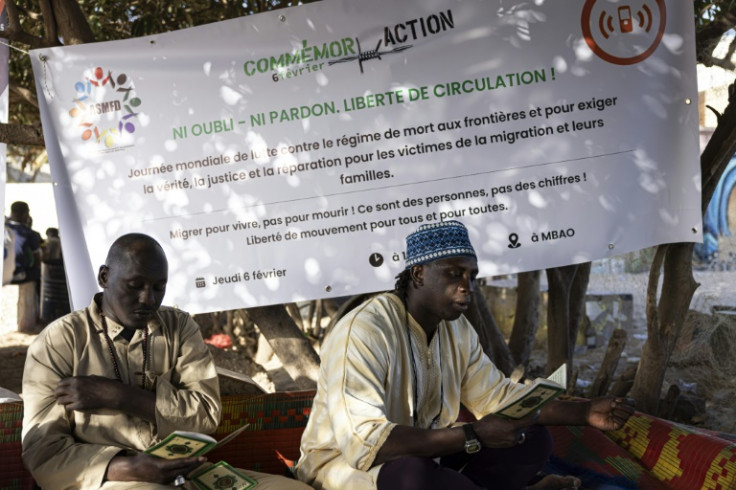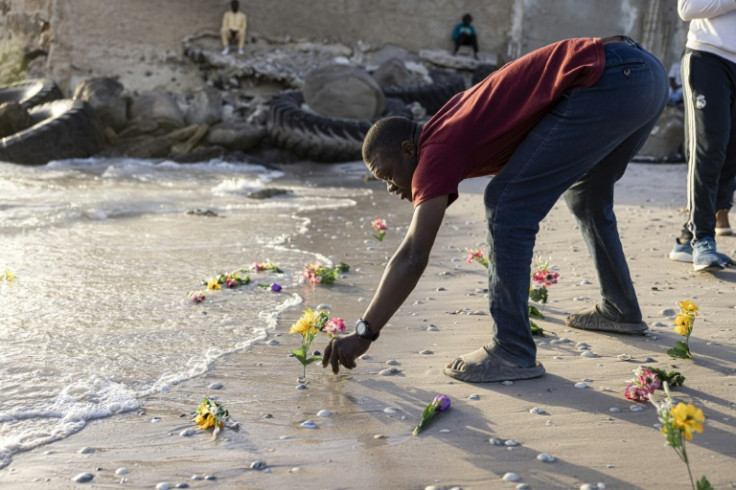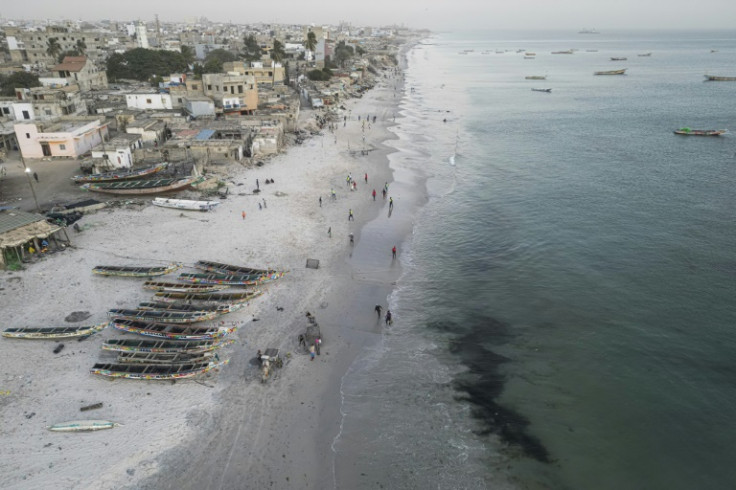Flowers In The Sand: Families Mourn Senegal Migrants Lost At Sea

Fatou Fall defiantly faced the ocean and sadly laid a flower on Mbao beach near Senegal's capital Dakar in memory of her husband -- one of many who left on perilous clandestine crossings for Europe but never returned.
The young widow was one of many of those left behind paying a low-key tribute to the country's migrants, whose dreams of a better life abroad were never fulfilled.
Barefoot on the sand, Fall contemplated sadly the flowers tossed about by the waves.
Around her, the beauty of the sparkling sea, colourful wooden pirogues and the deceptive gentleness of the surroundings hid the daily reality of the pain of loss.
"Migrate to live, not to die!" proclaimed a banner hung from the trees at the end of the beach by a local support group for migrants and their families.
As night fell on Thursday, religious leaders and relatives of the missing said a prayer and read from the Koran before scattering flowers silently in the sea.
The ceremony was part of "Commemor-action", an international drive to support the families of those who have died or disappeared while trying to migrate.
Wearing a long dress, Fatou Fall, 27, travelled the 80 kilometres (nearly 50 miles) north to Mbao from her home in Mbour, another coastal town hit by tragedy.
She had only been married for 18 months when her husband, her cousin and two other relatives drowned about four kilometres off Mbour when their boat capsized.
"My husband wanted to support his parents but it was difficult for him to find a job. Even people with qualifications can't do it," an emotional Fall told AFP.
"He decided to get in the boat. We were also hoping for a better life and we let him go," she sighed, adding that it was "important" to attend Thursday's event.
Senegal is one of the main departure points for thousands of Africans attempting the dangerous Atlantic route to Europe via the Spanish Canary Islands on overcrowded and often dilapidated boats.
Thousands have died in recent years and Senegal, where even young graduates struggle to find jobs, has been hit hard.
Municipal worker Seyni Ndoye, 55, said he came to Mbao to "share the memory" of his son Hassan, who was 20 when he boarded a boat with several friends.
Survivors told him that Hassan lost his life after a week at sea without eating, when his boat drifted off the coast of Cape Verde for about 10 days.
People on board did not want to keep his body and he was thrown overboard. "It's very painful," he said.
Tragedies at sea involving migrants remain a taboo subject and source of shame in Senegal, compounding the isolation and dismay of families searching for their loved ones.
Support groups for families exist in places such as Mbour, St Louis and Joal but raising awareness and the work of the associations remains difficult.
"In Senegal, the families of the dead and disappeared are ignored, they don't have the right to information or to research," said Ibrahima Konate, 31, who founded the Association for Solidarity of Migrants and Deprived Families (ASMFD).
"No one helps these families: the police, the government say that it's not their job, that they didn't send their children on migrant routes, even though it's the situation in Senegal that's forcing these young people to leave," he added.
"The families have a lot of difficulty accepting a bereavement without any information," Saliou Diouf, who founded the group "Boza Fi" ("Freedom Here" in the local Wolof language), told AFP.
ASMFD is demanding that the Senegalese authorities "mobilise" and "create a platform to help families do the research themselves".
Mamadou Pouye, 47, is from Mbao and lost his brother in a capsize several years ago. More recently, five of his friends died.
On Thursday, he recounted quietly the unbearable wait, the difficulty grieving and of keeping the memory of his brother Housseinou alive.
"We have lost hope of ever finding him," he said. "We would have liked to have taken him to the mortuary to fulfil the recommendations of religion... but we were unable to bury him.
"You don't even know where to go to pray for him and preserve his memory," he added. "It's very difficult."



© Copyright AFP 2024. All rights reserved.




















